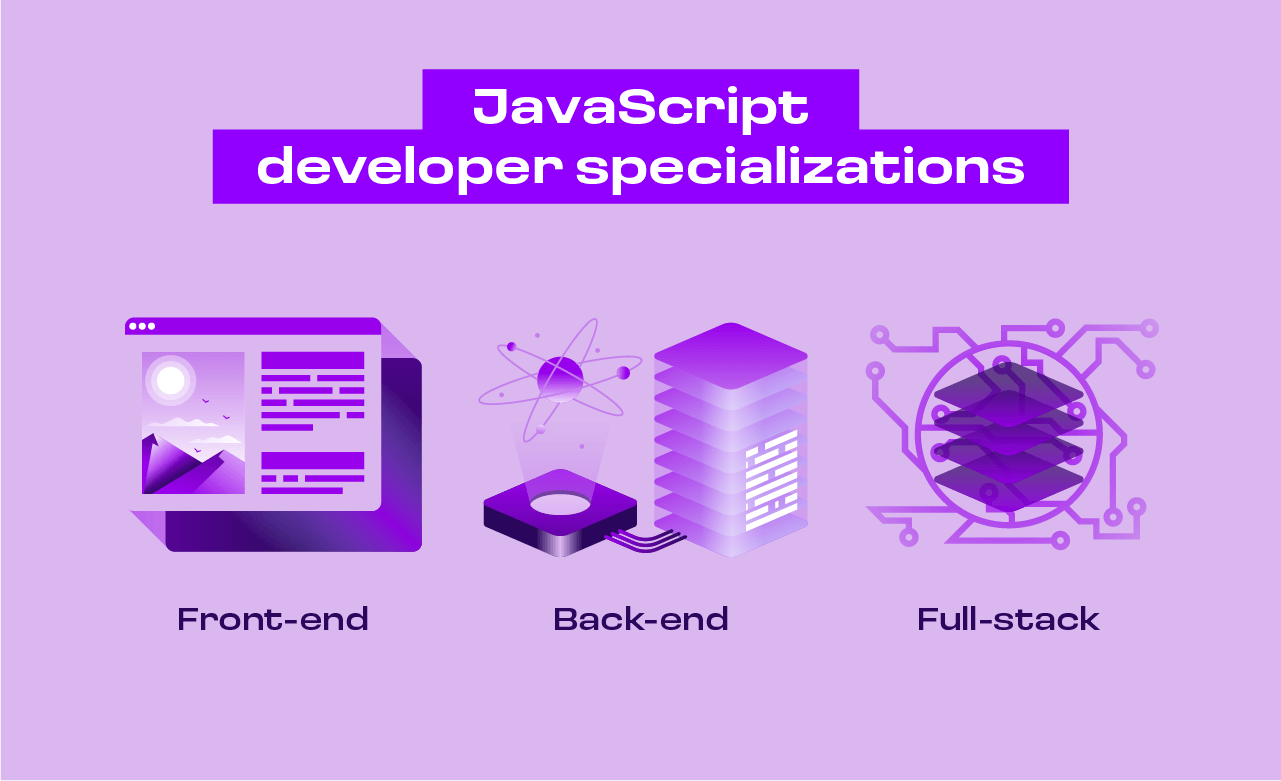JavaScript Career Path: A Comprehensive Guide to Success
The author of this article is tech expert Pieter Murphy.

For aspiring professionals looking to launch a career in technology or current professionals interested in pivoting into a high-demand specialty, the JavaScript career path is potentially the perfect option. The JavaScript scripting language is the foundation of many widely used solutions, and it’s incredibly versatile, making it popular.
Fortunately, the journey toward being a JavaScript specialist is reasonably straightforward and accessible. If you want to become a JavaScript developer, here’s a closer look at the JavaScript career pathway.
Is JavaScript a Good Choice for a Career?
Many people wonder, “Is JavaScript developer a good career?” Ultimately, the answer to that question is a resounding yes. There are ample JavaScript career opportunities since it’s one of the most widely used programming languages. Plus, its versatility allows professionals to focus their careers on the areas that interest them most, making their jobs rewarding.
The JavaScript developer career outlook is also impressive. For example, between 2022 and 2032, demand for web developers – who frequently use JavaScript to handle their duties – in the job market is projected to increase by 16 percent. That means pros with the necessary skills typically earn high salaries and secure robust benefits packages, and their earning potential is likely to increase over time since demand is high.
Finally, many other technology roles involve JavaScript. By working in JavaScript development, you’ll also have chances to pivot into many exciting areas if you choose, giving you enviable career flexibility if you want to change directions later.
Specializing in JavaScript

The broader JavaScript career scope includes a variety of specialty areas. JavaScript developers may focus on front-end or back-end development or work as full-stack developers, depending on their exact skill set.
Additionally, they may concentrate their careers on a particular development niche. For example, some professionals choose to harness their knowledge to become web developers. Along with using JavaScript, a web developer will also leverage HTML, CSS, and other related knowledge to create interactive web pages.
However, there are many other career paths related to JavaScript that are also worth considering. JavaScript developers may work on mobile or web applications, server-side systems, client-side functionality, and more. Plus, they often get to dive into other technical areas, including the aforementioned HTML and CSS, object-oriented programming, frameworks, libraries (like jQuery), open-source tools and code, and many others.
Ultimately, specializing in JavaScript can take a person’s career in many directions. Here is an overview of some of the main specialty areas to consider.
Front-end Development
In many cases, front-end development focuses on web development. Professionals in this arena spend time creating the interfaces end-users engage with when accessing sites through web browsers. They create the layouts, select colors, add navigation options, insert interactable links, place buttons, and set up popups. Plus, many work to ensure that websites show correctly when viewed on a variety of devices.
Along with handling UI/UX-related tasks, front-end developers spend time writing code. They may add animations to specific elements. Plus, they’ll create the code needed to extract data from servers to display information through the web-based user interface.
Building reusable code is also a critical part of the equation for a front-end JS developer career. By using JavaScript to create code that is usable in other projects, it streamlines future development dramatically.
Back-end Development
While not all server-side tech jobs rely heavily on JavaScript, many do require professionals to use JavaScript to handle a variety of tasks. Typically, this involves harnessing the power of Node.js to run JavaScript code on a server. Many of these developers also create the code required to support database interactions, ensuring the client-side part of the application can display the correct information.
Often, back-end development includes data storage and cybersecurity-related duties and functions, too. That ensures that incoming information is properly managed and that all connected systems are suitably safeguarded from intrusions or other cyber threats.
An understanding of front-end technology and programming languages is usually needed to execute the duties of a back-end JavaScript developer. Additionally, other skills related to back-end development – such as database languages and architecture, cloud-based solutions like Amazon Web Services (AWS), and API design and support – are necessary to push your career forward.
Full-stack Development
As a full-stack developer, professionals have the knowledge and skills necessary to handle both front-end and back-end development duties. Essentially, they’re jacks of all trades in this arena, operating as a single person who can handle client-side and server-side coding.
For many professionals moving down the JavaScript career path, working as a full-stack developer isn’t where they begin their careers. Instead, they initially specialize in back-end or front-end development. Then, when the opportunities arise, they hone skills related to the other side of the equation. Once they have a robust enough skill set, they can operate as full-stack development specialists.
Many companies prefer full-stack JavaScript developers because it limits the total size of their needed workforce. They can reduce the total number of team members since full-stack developers understand both sides of the JavaScript code equation.
How to Start a JavaScript Developer Career
For anyone who wants to become a JavaScript developer, the first step they should take is to review the roadmap for a JavaScript developer. That provides an overview of how their careers will unfold, making it easier to plan each step of the broader journey.
However, there are a few basics that almost universally serve as solid starting points. The most critical part of the equation is to learn JavaScript. Fortunately, there are several reliable ways to acquire that skill.
First, checking out some of the best books to learn JavaScript is an excellent way to begin. There are many that focus on aspiring professionals with little to no experience, allowing them to serve as functional primers to ensure people build the necessary foundation.
After familiarizing themselves with various core concepts, moving on to web-based or online courses is an excellent choice. With many of these classes, students get to learn practical application. They’ll get to write pieces of code and test their functionality.
While the types of self-direct learning above can work well on their own, most professionals are well-served by earning formal credentials. The most straightforward option is to get a Bachelor’s degree in a related major, such as web development or computer science. However, bootcamps that come with certificates are also worth considering.
Finally, for those looking to start a JavaScript career, don’t forget to learn any needed supplemental technologies and skills. For example, anyone focusing on front-end web development should hone their HTML and CSS capabilities. Additionally, staying updated with the latest JavaScript trends is crucial as the landscape of web development is constantly evolving.
For professionals who aren’t sure what exactly to cover, reviewing entry-level job descriptions is an excellent way to find out what’s necessary. Those will outline the exact capabilities employers are after, giving aspiring pros a clear idea of what they need to know.
JavaScript Developer Roles

Generally, the JavaScript developer career path is reasonably straightforward. Professionals typically begin in entry-level positions, either as trainees or as junior developers. Then, as they acquire experience and hone their skills, they have the necessary capabilities to advance into the next higher position up the ladder.
Here’s a brief overview of the JavaScript developer roles most professionals work their way through during their careers.
Trainee
For those looking to start a career in JavaScript development, finding a trainee position is worth considering. These positions are particularly worthwhile for aspiring professionals without much formal education, as these jobs are often focused on learning above all else, not unlike an internship
While in a trainee position, professionals receive ample guidance and support as they assist with a variety of projects. Often, any of their deliverables are carefully reviewed, creating opportunities for in-depth feedback that supports growth. Assignments are also commonly on the simpler side, which can make working in the roles less intimidating to those new to JavaScript.
When working in a trainee developer job, professionals should focus on learning and professional development. These positions mainly exist as skill-building opportunities, so embrace the educational side of the equation as much as possible.
Many trainee positions are inherently short-term. When they are, the primary goal is building up the employee’s skills enough to move them into the next position up the ladder. However, some aren’t automatically timebound, essentially giving the selected professional as much time as they need to become suitably competent.
Junior JavaScript Developer
The next step in a career in JavaScript development is becoming a junior JavaScript developer. Generally, this is an entry-level role that allows professionals to take on simpler tasks with less oversight than is commonly seen in trainee positions. They may also handle intermediate responsibilities with a bit of direct guidance.
Precisely what the role involves varies from one employer to the next. However, junior JavaScript developers often monitor, test, and debug code as a core part of their duties. They also build their understanding of data structures, frameworks, algorithms, web applications, object-oriented programming, and other critical knowledge areas.
Depending on the specialty area, junior JavaScript developers may also have other duties. For example, those concentrating on front-end development may put their CSS skills to work, while back-end developers may dive into SQL.
A crucial part of succeeding as a junior developer is asking questions and getting needed guidance. A lot of professional development occurs at this stage, so reaching out, when necessary, creates learning opportunities.
Middle JavaScript Developer
After gaining a few years of experience, professionals working along the JavaScript developer career path can usually transition into a middle developer job. At this level, JavaScript professionals typically have solid enough skills to work with minimal supervision or little help from colleagues. Additionally, they usually handle intermediate tasks.
At this stage, developers often have robust troubleshooting capabilities. Additionally, they can create interactive features independently, write code effectively, and even assist with overall strategy. They’re also commonly familiar with code review techniques, refactoring, and unit tests, and they have an in-depth understanding of the core frameworks related to their roles.
Many middle JavaScript developers also gain a strong understanding of critical development methodologies that support continuous integration (CI) and continuous delivery (CD). For example, they may perform well in Agile or DevOps environments due to their methodology experience.
It’s also common for middle developers to get opportunities to handle advanced JavaScript tasks. However, they may do so with oversight from more senior team members, especially initially.
Senior JavaScript Developer
One of the later steps in the career path for JavaScript developers is becoming a senior JavaScript developer. Professionals at this level are typically able to handle nearly any individual contributor task without assistance or guidance from managers or colleagues. They’re also highly proactive when it comes to solving problems and supporting strategic decisions.
During this career phase, professionals usually work on some of the most complex projects their employer has available. They’re often viewed as subject-matter experts, so they’re trusted with more complicated duties, high-visibility tasks, and scenarios where the stakes are higher.
At this career stage, JavaScript developers don’t just understand the technologies they use; they know the pros and cons of the available options. That allows them to make smart, independent choices when given responsibilities, ensuring the outcomes align with organizational goals, project objectives, and more.
It’s also common for senior developers to handle project documentation. Plus, many take on some light leadership responsibilities at this stage. For example, they may not just take part in projects but oversee teams of junior members. Additionally, senior JavaScript development professionals may mentor or train less-experienced staff to help them enhance their capabilities.
Team Lead or Manager
After spending time at the senior level and honing their leadership capabilities, JavaScript professionals may have a chance to move into a supervisory or managerial rank. Precisely what the role entails can vary depending on several factors, with one of the most significant being the size and nature of the company’s technical teams.
However, these roles mean shifting away from being an individual contributor and focusing more on leadership-related tasks. Delegation, project management, coaching, oversight, and offering feedback to other employers are big parts of the equation. Strategic decision-making is also a substantial part of the job. Plus, it’s common to take on duties related to budget management, as well as communicating directly with stakeholders.
Team leads and managers may also have duties related to technology selection and implementation. For example, they may evaluate vendor offerings to select the ideal solution for the company, allowing them to introduce new technical capabilities to an environment.
It’s also typical for team leads and managers to have a significant amount of say-so regarding the composition of their staff. As a result, hiring and firing decisions are often part of the role, too.
JavaScript Career Path Tips from Beginner to Pro
The career scope in JavaScript is extensive, so it’s wise to have a plan for moving up the ladder. As a result, the biggest tip is being strategic about professional development, as that’s usually the key to long-term success.
For JavaScript professionals, preparing to pursue relevant certifications is an excellent way to improve their credibility. Precisely which certifications provide value does vary depending on the specialty area. For example, front-end JavaScript developers may benefit from becoming Certified Web Developers, while back-end specialists may want to consider an AWS Certified Developer certification.
Beyond credentials, gaining experience is critical to the success equation. The more time spent working with JavaScript, the more a professional knows and understands the language and the project types they handle. Taking the time to develop expertise related to specific libraries and frameworks – such as React, Node.js, Angular, or Vue.js – is also worth considering, as it can help professionals stand out among other developers.
Seizing opportunities to lead is also beneficial. By taking ownership of projects and coordinating the efforts of others, professionals prepare themselves for future supervisory or management roles. As a result, it’s far easier to advance when the time comes, as they have clear related experience.
Conclusion
Ultimately, the JS career path is one worth pursuing. The positions offer highly competitive salaries and typically come with robust benefits packages. Plus, since JavaScript developers are in demand, compensation is on the rise as companies use increased wages to attract the best and brightest talent.
Additionally, the JavaScript developer career pathway is relatively straightforward. Often, progression is based on acquiring the necessary experience and honing one’s skills, allowing professionals to qualify for the next role up the ladder. Along with formal education, consider self-direct learning to boost your capabilities and ensure you’re providing sufficient value to your employer. It’s also wise to acquire certifications when the opportunity arises, as they’re an excellent way to separate yourself from other candidates.
With dedication and hard work, becoming a JavaScript developer is possible. Plus, the role is incredibly rewarding, as you’ll get a chance to be a part of the future of technology. Use this guide to get moving in the right direction, and you’ll be well on the way toward the career of your dreams.

.png)
